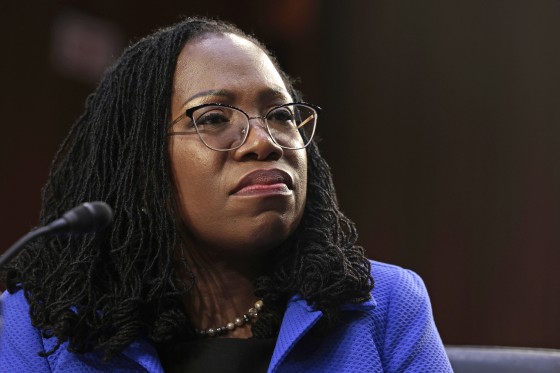As demoralizing as last week’s Supreme Court decision effectively striking down affirmative action in higher education was for those of us who are realistic about the state of the country’s race relations, we saw in Justice Ketanji Brown Jackson a bright light. In her powerful dissenting opinion, the third African American on the court and the first African American woman provided a masterful account of race relations in the United States and an indictment of the myth of “color-blindness.”
The third African American on the court provided a masterful account of race relations in the United States and an indictment of the myth of “color-blindness.”
Jackson’s dissent should be necessary reading for all Americans, especially those who have accepted the lie that race does not meaningfully affect American society. In a scathing criticism of her conservative colleagues, she provides an elegant history lesson —charting the policies and laws that upheld racial discrimination and deepened inequality in the United States. From Dred Scott v. Sandford (1857), which declared that an African American had “no rights which the white man was bound to respect,” to the Plessy v. Ferguson (1896) decision that codified Jim Crow and later racist practices such as redlining, Jackson enumerated some of the many ways Black people have been treated as second-class citizens.
“Gulf-sized race-based gaps exist with respect to the health, wealth, and well-being of American citizens,” she wrote. “They were created in the distant past, but have indisputably been passed down to the present day through the generations.”
Reminiscent of Thurgood Marshall, who before he became the first African American on the Supreme court was the lawyer who successfully argued the case that ended “separate but equal” policies in U.S. schools, Justice Jackson, in her dissent, laid out a case for the significance of affirmative action in higher education.
Marshall was a significant figure in the Civil Rights Movement, but last week’s 6-3 decision is an attack on the progress made during that movement that will have devastating consequences for members of marginalized groups. It represents a major blow to diversity in higher education.
President Joe Biden nominated Jackson to the bench last year after he had promised on the campaign trail to nominate the first African American woman to the Supreme Court. His promise to name an African American woman was criticized by those who argued that such an appointment would somehow result in an unqualified nominee.
However, Jackson has already demonstrated why her nomination was one of the best decisions Biden has made. Jackson is not only a brilliant attorney, but one of the sharpest thinkers of our time. Her dissenting opinion last week offers just a glimpse of her remarkable command of the law — as well as the history and impact of affirmative action in higher education.
In effectively ending affirmative action, the court’s conservative majority sided with the Students for Fair Admissions, whose lawsuit alleged that admissions policies at Harvard discriminate against Asian American applicants “and give unlawful and unfair preferences to white, Hispanic and Black applicants.” Although Jackson recused herself from the Harvard case, she weighed in on a related case brought by the Students for Fair Admissions against the University of North Carolina, which argued that the university discriminated against white and Asian American students. While critics of affirmative action in higher education rejoice over the recent ruling, it undermines the nation’s effort to level the playing field and offer some redress for centuries of educational and economic inequality directed at Black and Hispanic students.
The reality is simple. That ruling represents a major setback for students from marginalized communities who already face significant barriers to accessing quality education in this country. As Crystal Sanders, an associate professor of African American studies at Emory University and author of "A Chance for Change," explained to me, “The consequences of this decision are of a magnitude that cannot easily be quantified.” She added, “Without meaningful and concrete efforts to increase diversity in higher education, there will be fewer nonwhite physicians, attorneys, and teachers.”

Justice Jackson made that clear in her dissenting opinion.
The need for affirmative action in higher education is evident by simply considering the history of education in the United States. During the antebellum period, white slaveholders barred enslaved Black people from learning how to read and write, and the Black people who did learn often learned through covert methods.
During Reconstruction, white supremacists burned over 600 Black schools to the ground, and Jim Crow laws ensured that white school districts were better funded than those with predominantly Black students. Despite Marshall successfully arguing Brown v. Board of Education, it has been an uphill battle to desegregate schools throughout the country.
Inequities in education persist to this day. As Eddie R. Cole, an associate professor of education and history at the University of California, Los Angeles, and author of "The Campus Color Line" told me, “We cannot separate dismantling affirmative action from the efforts to end campus diversity, equity, and inclusion initiatives and faculty tenure, ban teaching about the nation’s racial history, and underfund of Black colleges and universities.” He continued, “We’re witnessing an all-out assault on education — particularly Black education — and the result will dramatically reduce educational opportunity for decades to come.”
Jackson’s dissent wrote, “The point is this: Given our history, the origin of persistent race-linked gaps should be no mystery. It has never been a deficiency of Black Americans’ desire or ability to, in Frederick Douglass’s words, ‘stand on [their] own legs.’”

Crystal Sanders calls that dissent “a tour de force of United States history that demonstrated just how far the United States Supreme Court’s conservative justices had strayed from the letter and spirit of the Fourteenth Amendment.”
The dissent is also a call to action. Sanders views Jackson’s response as a way of compelling all Americans to decide which side they stand on. With full knowledge of the history of racism and discrimination in this country, one would have to be ignorant or complicit not to see how the recent Supreme Court ruling sets us back — instead of helping us move forward as a nation. All Americans, regardless of one’s views on affirmative action, should carefully consider Jackson’s dissenting opinion. As a brilliant mind and the only Black woman on the court, she brings a unique and invaluable perspective that we should all take seriously.
Listen to award-winning actress Alfre Woodard read Supreme Court Justice Ketanji Brown Jackson’s entire 29-page dissent to the affirmative action ruling here.

